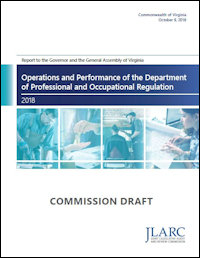As the old saying goes, you find what you look for. And in its examination of occupational licensing in Virginia the Joint Legislative Audit and Review Commission (JLARC) largely found what it was looking for — inefficiencies and overcharges. Conducting the review was worthwhile, but the exercise was small ball — it missed the opportunity to examine much bigger issues.
In 2017, JLARC instructed its staff to study the Department of Professional and Occupational Regulation (DPOR) staffing and organization, its processing of occupational licenses, and its enforcement of occupational rules. Staff also assessed the affordability of fees and the processes for adjusting fees.
Here’s what JLARC did not study: To what extent does licensing create barriers to entry into the regulated occupations and professions? To what extent do regulated professions use regulations to protect their occupational turf and boost their earnings? To what extent does the public suffer from these legalized labor monopolies?
To its credit, given the limited scope of its inquiry, JLARC did come up with some interesting findings in “Operations and Performance of the Department of Professional and Occupational Regulation“:
- No legal justification for regulating 11 occupations. Eleven occupations regulated by DPOR appear not to meet the criteria for regulation established in the state code. These include community managers, opticians, residential energy analysts, soil scientists, landscape architects, waste management facility operators and others. Regulation of these occupations does nothing to advance the public health, safety and welfare of the public.
- Excess fees. DPOR is funded by the fees it charges to applicants. DPOR’s method for calculating fees has over-projected agency expenses leading to unnecessarily high fees in the past. Fees have been reduced since, but the balance still has grown $27.2 million — up from $15 million ten years ago, and far more than needed.
- Many complaints go unexamined. Staff closed 71% of the disciplinary cases it opened in FY17. Staff do not investigate all potential violations.
- Poor use of IT. DPOR does review and approve licensing requests in a timely manner, but it would make the process more user friendly by making it more accessible online and by automating key processes.
These are all useful findings, and the report makes some 36 recommendations on how to improve the system. While the goal of improving administrative productivity is laudatory, however, making a flawed system work more efficiently doesn’t do much to build a more prosperous, equitable Commonwealth.
Conservatives have long targeted occupational licensing for creating barriers to upward mobility. Do the state’s 73,000 barbers and cosmetologists really need regulating? Do they really need formal education and credentialing? Is the public health and safety truly harmed if someone gets a bad haircut or cracked fingernail? The crafts of hair cutting, cosmetology and hair-braiding, which provide an avenue of occupational mobility for lower-income Virginians, could be taught perfectly adequately in informal apprenticeships. Why burden people with educational costs and licensing fees?
Of greater concern is the regulation of the medical professions. In theory, the system is designed to protect the public from frauds, charlatans and malpractice. The system does do that, so some form of licensing is necessary. But the system also carves out occupational turf, protecting doctors from competition from nurse practitioners, and nurse practitioners from registered nurses, and registered nurses from licensed practical nurses, and so on down the line. That may not be a big problem in major metro areas, but it is a huge problem in large swathes of rural Virginia that have trouble recruiting medical professionals.
Indeed, it is fair to say that the crisis of access and affordability in rural health care is largely the result of rigid occupational licensing rules that prevent nurses from performing a high percentage of the routine procedures, and dental hygienists from cleaning teeth and filling simple cavities. No health care, it appears, is better than health care not delivered by doctors and dentists.
I would love to think that the General Assembly might get serious about tackling these issues. But I don’t see it ever happening. As the Richmond Times-Dispatch editorial page observes today, only one in twenty jobs required government certification a half century ago. Today, one in four does. It should come as no surprise that highly compensated professions, intent upon maintaining their occupational monopolies, have become major campaign contributors. According to the Virginia Public Access Project, physicians have donated $347,000 to political campaigns so far in 2018-19, dentists $223,000, optometrists $114,000. Nurses? Only $33,000. Don’t expect rural healthcare reform unless it involves paying doctors and dentists more money.


Leave a Reply
You must be logged in to post a comment.